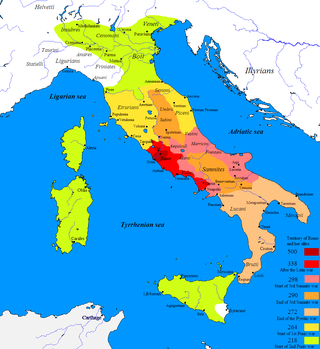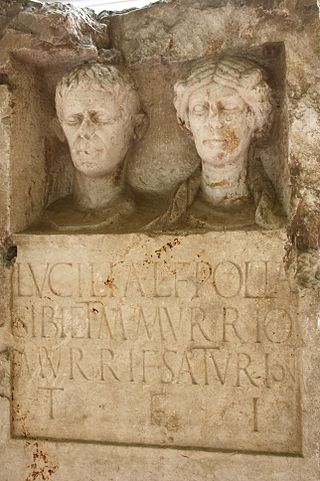Lucilius Longus was a Roman politician and senator of the Roman Empire in the 1st century. [1] [2]
Lucilius Longus was a Roman politician and senator of the Roman Empire in the 1st century. [1] [2]
Lucilius Longus (his Praenomen is unknown), was a homo novus and a friend of Tiberius. In 6 BC, He accompanied Tiberius into his self-imposed exile on Rhodes. [1]
On 1 July AD 7, Lucilius was created suffect consul due to the death of the regular consul Aulus Licinius Nerva Silianus. He held the consulship together with Quintus Caecilius Metellus Creticus Silanus as his colleague. [2]
After his death in AD 23, the Senate placed a statue of Lucilius in the Forum of Augustus. [1]

Tiberius Julius Caesar Augustus was Roman emperor from AD 14 until 37. He succeeded his stepfather Augustus, the first Roman emperor. Tiberius was born in Rome in 42 BC to Roman politician Tiberius Claudius Nero and his wife, Livia Drusilla. In 38 BC, Tiberius's mother divorced his father and married Augustus. Following the untimely deaths of Augustus's two grandsons and adopted heirs, Gaius and Lucius Caesar, Tiberius was designated Augustus's successor. Prior to this, Tiberius had proved himself an able diplomat and one of the most successful Roman generals: his conquests of Pannonia, Dalmatia, Raetia, and (temporarily) parts of Germania laid the foundations for the empire's northern frontier.

Year 218 BC was a year of the pre-Julian Roman calendar. At the time it was known as the Year of the Consulship of Scipio and Longus. The denomination 218 BC for this year has been used since the early medieval period, when the Anno Domini calendar era became the prevalent method in Europe for naming years.

Publius Cornelius Scipio was a general and statesman of the Roman Republic and the father of Scipio Africanus.

The gens Claudia, sometimes written Clodia, was one of the most prominent patrician houses at ancient Rome. The gens traced its origin to the earliest days of the Roman Republic. The first of the Claudii to obtain the consulship was Appius Claudius Sabinus Regillensis, in 495 BC, and from that time its members frequently held the highest offices of the state, both under the Republic and in imperial times.
The gens Tullia was a family at ancient Rome, with both patrician and plebeian branches. The first of this gens to obtain the consulship was Manius Tullius Longus in 500 BC, but the most illustrious of the family was Marcus Tullius Cicero, the statesman, orator, and scholar of the first century BC. The earliest of the Tullii who appear in history were patrician, but all of the Tullii mentioned in later times were plebeian, and some of them were descended from freedmen. The English form Tully, often found in older works, especially in reference to Cicero, is now considered antiquated.

The gens Lucilia was a plebeian family at ancient Rome. The most famous member of this gens was the poet Gaius Lucilius, who flourished during the latter part of the second century BC. Although many Lucilii appear in Roman history, the only one known to have obtained any of the higher offices of the Roman state was Lucilius Longus, consul suffectus in AD 7.

The gens Julia was one of the most prominent patrician families in ancient Rome. Members of the gens attained the highest dignities of the state in the earliest times of the Republic. The first of the family to obtain the consulship was Gaius Julius Iulus in 489 BC. The gens is perhaps best known, however, for Gaius Julius Caesar, the dictator and grand uncle of the emperor Augustus, through whom the name was passed to the so-called Julio-Claudian dynasty of the first century AD. The nomen Julius became very common in imperial times, as the descendants of persons enrolled as citizens under the early emperors began to make their mark in history.

The gens Junia or Iunia was one of the most celebrated families of ancient Rome. The gens may originally have been patrician, and was already prominent in the last days of the Roman monarchy. Lucius Junius Brutus was the nephew of Lucius Tarquinius Superbus, the seventh and last king of Rome, and on the expulsion of Tarquin in 509 BC, he became one of the first consuls of the Roman Republic.

The gens Pompeia was a plebeian family at ancient Rome, first appearing in history during the second century BC, and frequently occupying the highest offices of the Roman state from then until imperial times. The first of the Pompeii to obtain the consulship was Quintus Pompeius in 141 BC, but by far the most illustrious of the gens was Gnaeus Pompeius, surnamed Magnus, a distinguished general under the dictator Sulla, who became a member of the First Triumvirate, together with Caesar and Crassus. After the death of Crassus, the rivalry between Caesar and Pompeius led to the Civil War, one of the defining events of the final years of the Roman Republic.

The gens Calpurnia was a plebeian family at ancient Rome, which first appears in history during the third century BC. The first of the gens to obtain the consulship was Gaius Calpurnius Piso in 180 BC, but from this time their consulships were very frequent, and the family of the Pisones became one of the most illustrious in the Roman state. Two important pieces of Republican legislation, the lex Calpurnia of 149 BC and lex Acilia Calpurnia of 67 BC were passed by members of the gens.
Tiberius Sempronius Longus was a Roman consul during the Second Punic War and a contemporary of Publius Cornelius Scipio. In 219 BC, Sempronius and the elder Scipio were elected as consuls for 218 BC. At the outbreak of the war in 218 BC, he was ordered to conduct the war effort in Sicily and Africa, while Scipio was sent to the Iberian Peninsula to attack Hannibal himself. Sempronius was allocated two Roman legions, 16,000 allied infantry, 1,800 allied cavalry, 160 quinqueremes and 20 lighter vessels. As soon as his army was assembled he moved his forces to Sicily. Striking from Lilybaeum Sempronius captured Malta from the Carthaginians.
Tiberius Sempronius Longus was a statesman and general of the Roman Republic. He was praetor assigned to Sardinia in 196 BC, consul in 194 BC, and a contemporary of Scipio Africanus. He was the son of Tiberius Sempronius Longus who commanded Roman legions during the Second Punic War and was the consular colleague of Scipio Africanus’ father.

Marcus Gavius Apicius is believed to have been a Roman gourmet and lover of luxury, who lived sometime in the 1st century AD, during the reign of Tiberius. The Roman cookbook Apicius is often attributed to him, though it is impossible to prove the connection. He was the subject of On the Luxury of Apicius, a famous work, now lost, by the Greek grammarian Apion. M. Gavius Apicius apparently owed his cognomen to an earlier Apicius, who lived around 90 BC, whose family name it may have been: if this is true, Apicius had come to mean "gourmand" as a result of the fame of this earlier lover of luxury.

The gens Sempronia was one of the most ancient and noble houses of ancient Rome. Although the oldest branch of this gens was patrician, with Aulus Sempronius Atratinus obtaining the consulship in 497 BC, the thirteenth year of the Republic, but from the time of the Samnite Wars onward, most if not all of the Sempronii appearing in history were plebeians. Although the Sempronii were illustrious under the Republic, few of them attained any importance or notice in imperial times.
The gens Octavia was a plebeian family at ancient Rome, which was raised to patrician status by Caesar during the first century BC. The first member of the gens to achieve prominence was Gnaeus Octavius Rufus, quaestor about 230 BC. Over the following two centuries, the Octavii held many of the highest offices of the state; but the most celebrated of the family was Gaius Octavius, the grandnephew and adopted son of Caesar, who was proclaimed Augustus by the senate in 27 BC.

The gens Pomponia was a plebeian family at ancient Rome. Its members appear throughout the history of the Roman Republic, and into imperial times. The first of the gens to achieve prominence was Marcus Pomponius, tribune of the plebs in 449 BC; the first who obtained the consulship was Manius Pomponius Matho in 233 BC.
Aulus Licinius Nerva Silianus was a Roman senator who was active during the Principate. He was consul in AD 7 as the colleague of Quintus Caecilius Metellus Creticus Silanus. Silianus was born the second of three sons of Publius Silius Nerva, consul in 20 BC, and was later adopted by Aulus Licinius Nerva. Velleius Paterculus salutes him for his simplicissimus.

The capture of Malta was the successful invasion of the Carthaginian island of Malta by forces of the Roman Republic led by Tiberius Sempronius Longus in the early stages of the Second Punic War in 218 BC.